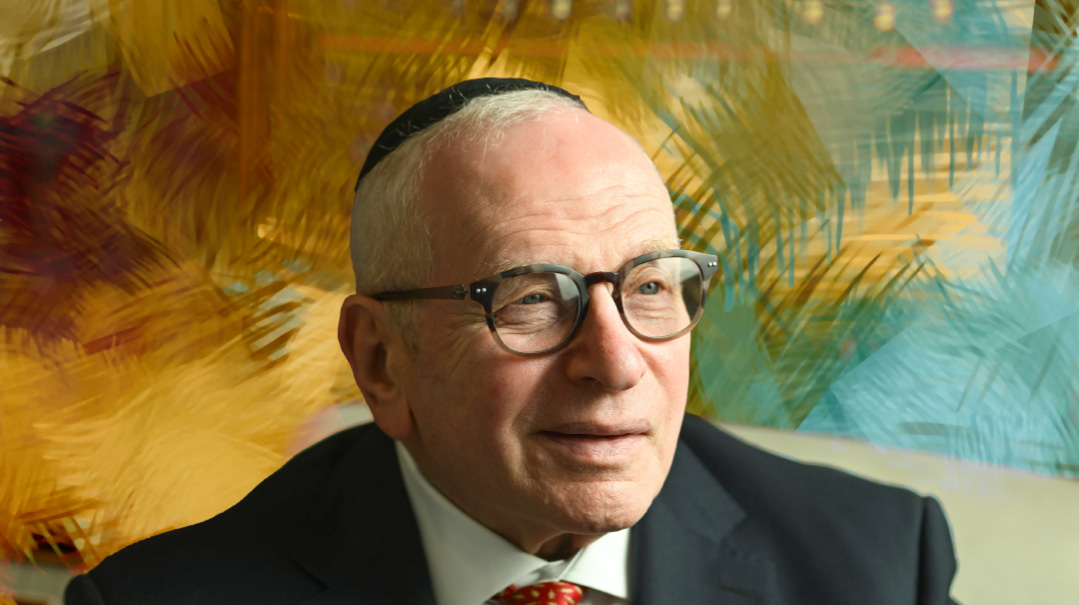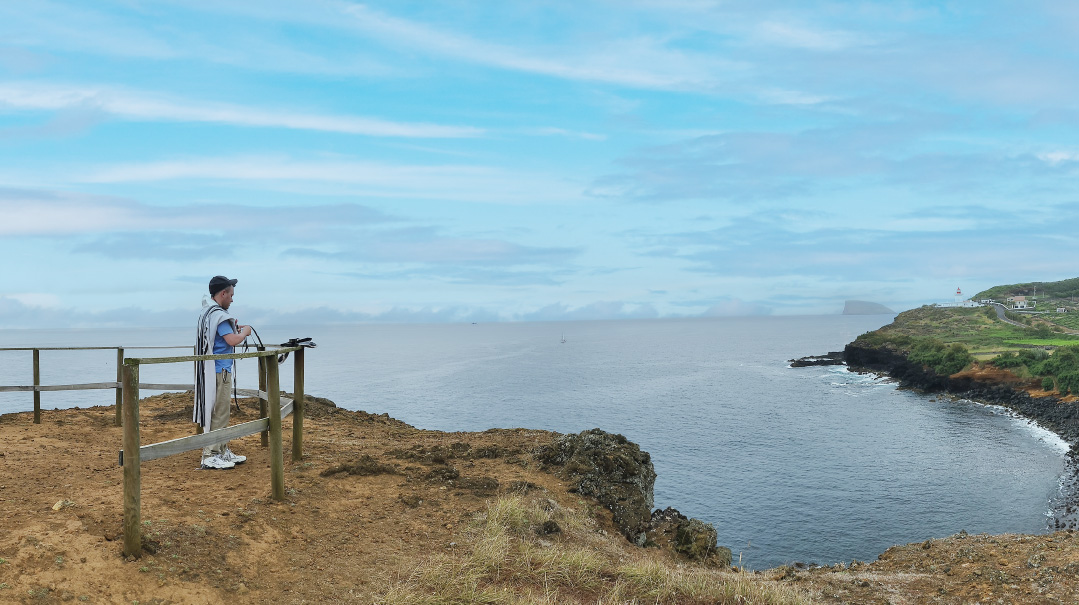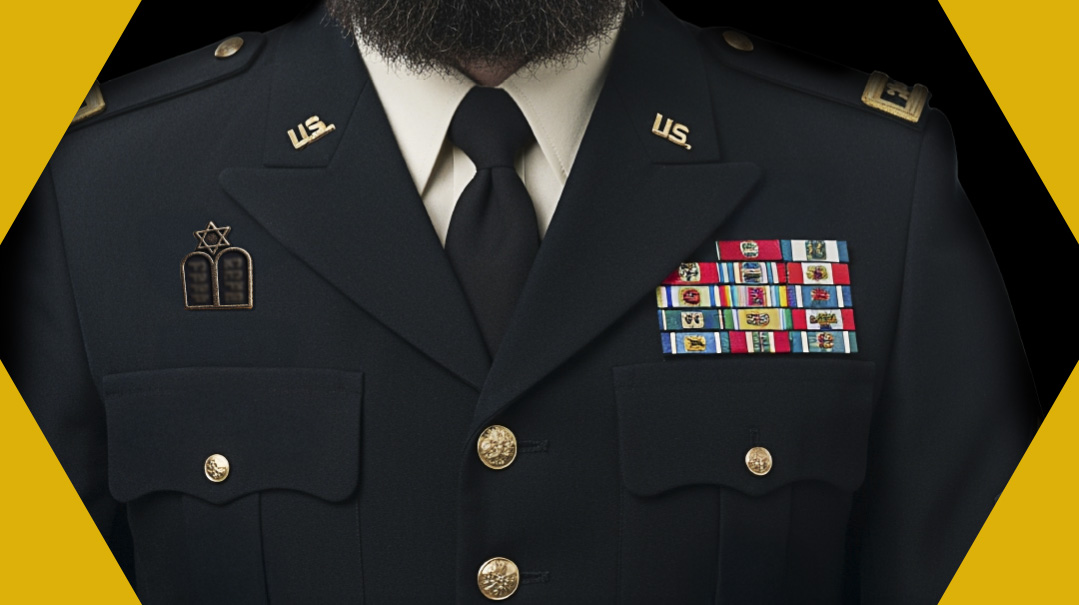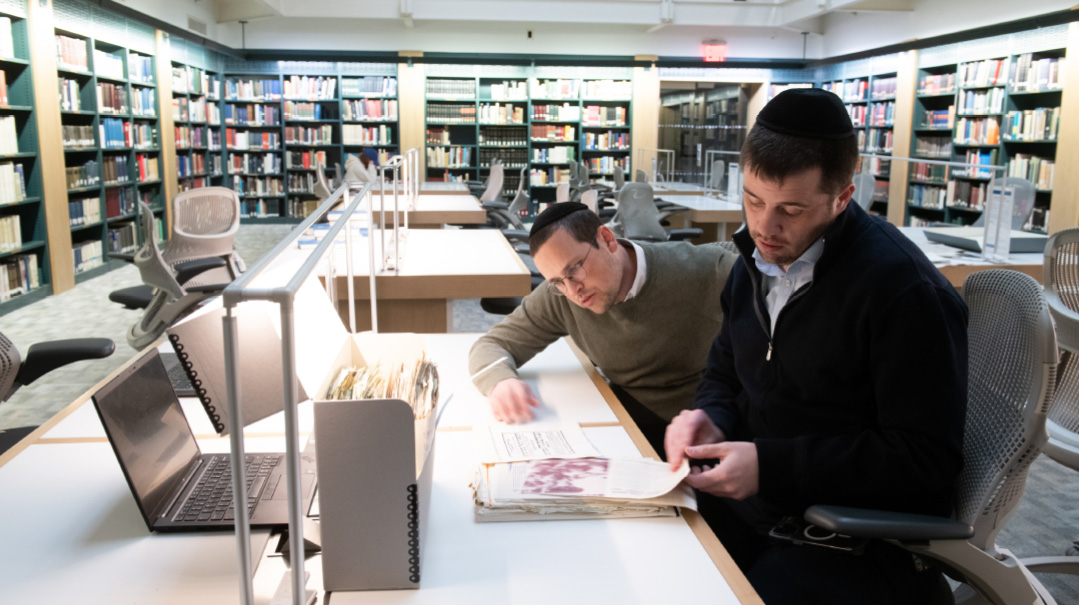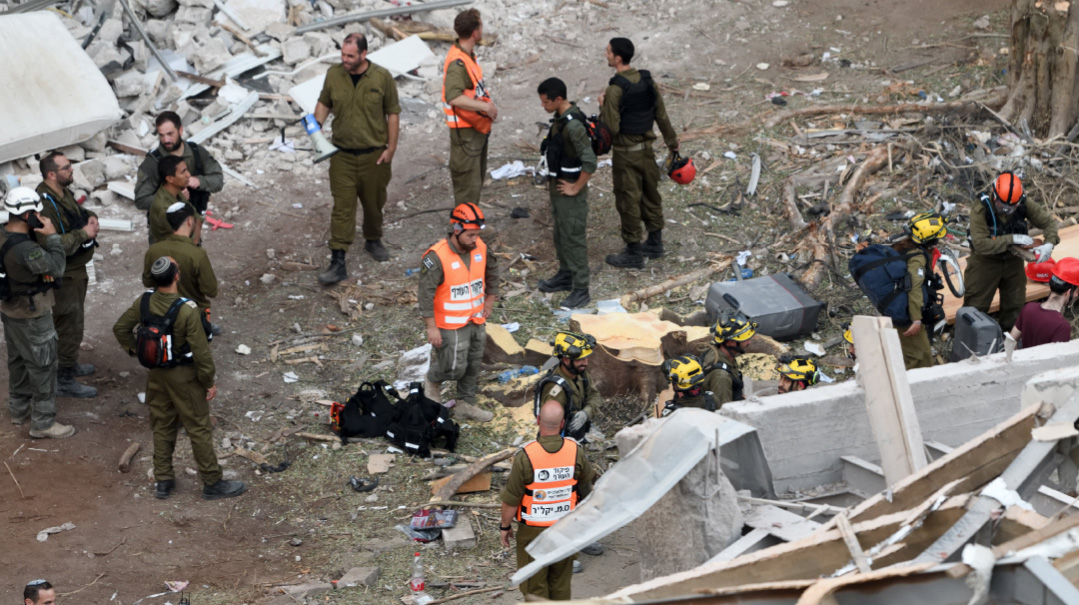With Perfect Faith

Since his son Dovi perished in Meron last Lag B’omer, Shloimi Steinmetz has become a model of how a Yid reacts to catastrophe
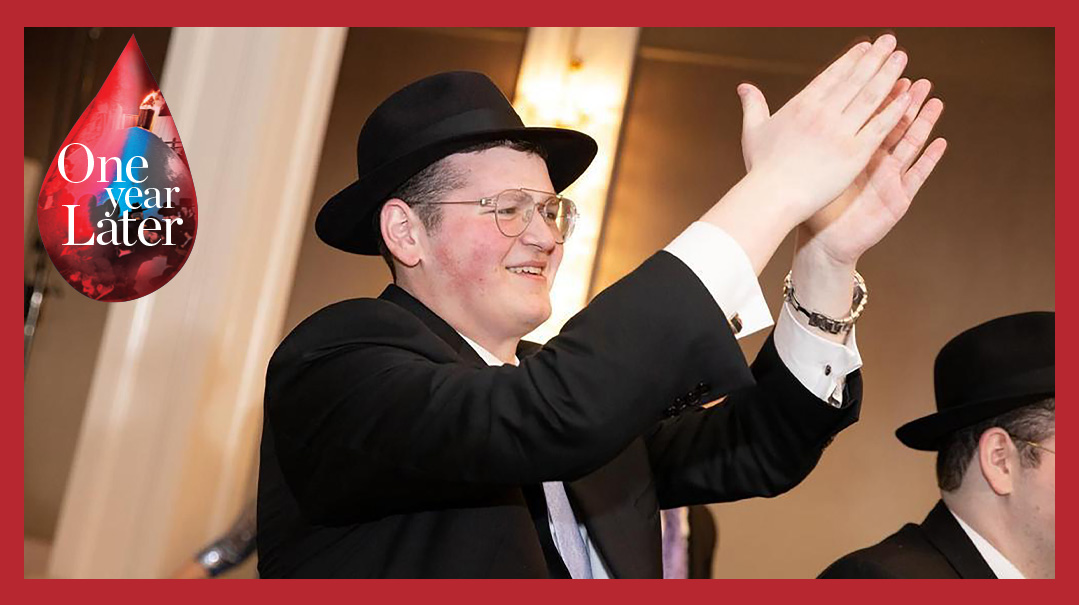
Photos: Family archives
In the Mir, Dovi segued into the familiar role of caretaker, dirah manager, seudah supplier and networker. His entire life was about doing things for others — and in his death, he removed all the barriers
While many of us have been raised with the concept that things are exactly the way they should be even when we don’t understand, the real challenge comes when painful realities interfere with that intellectual knowledge.
And maybe that’s why Reb Shloimi Steinmetz, a self-proclaimed “poshute Yid” from Montreal, one of those community-conscious “regular” guys from shul who do daf yomi every morning and give tzedakah generously, has over the last year become an international ambassador for faith and resilience.
He’s not a mechanech or a public speaker or a rebbe — he’s a businessman who manufactures doors — but since his 21-year-old son Dovi perished in Meron last Lag B’omer along with 44 others, Shloimi Steinmetz has become a model of how a Yid reacts to catastrophe and how he can use a personal tzarah to create something way beyond himself or the loved one he’s mourning. With fortitude he never knew he had, Reb Shloimi issued a cry of emunah that has reverberated across the world, expressing faith in the precision of the Divine plan when we understand — and mostly, when we don’t.
You might have seen the Ani Maamin cards he’s printed (over 150,000 to date), l’illui nishmas Yissachar Dov Berish ben Shlomo, and maybe you’ve already joined with the hundreds of thousands who have taken on a 90-second daily commitment to recite the 13 Principles of Faith after davening each morning. And you might have noticed that although it was initially about creating zechuyos for the neshamah of Dovi Steinmetz and the other niftarim, it’s changed your life a bit as well. Who couldn’t use a little more emunah to start the day, creating a cocoon of tranquility and confidence for whatever lies ahead?
WATCH: Take 2 with Shloime Steinmetz
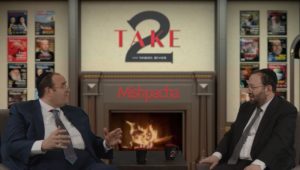
It’s in the Genes
But perhaps the initiative isn’t so surprising after all — because the Steinmetzes are a family trained to be there for others. It’s in their DNA, going back to Zeide Yitzchak Yisrael Steinmetz who survived the Holocaust because he was big and strong (Reb Shloimi himself is 6’5” and his boys, including Dovi a”h, are all over six feet) and the Nazis used him to clear the rubble after Allied bombings. His greatest joy was to find a little food among the debris and smuggle it back to his fellow inmates to keep them alive. After the war he moved to Antwerp, where he opened a bakery that provided bread and rolls for the shuls, and every day he would bring breakfast to all the homeless and indigent people who would congregate in the beis medrash of Rebbe Yankele of Pshevorsk.
“You could say emunah was ‘baked’ into us,” says Reb Shloimi. “I grew up in Antwerp and as the oldest einekel, I learned a lot from my zeide. He was always talking about ‘his close friend Rav Meir’l’ and it took us kids a long time to realize he meant Rabi Meir Baal Haneis — he literally lived with him at his side.”
Being a giver, Steinmetz-style, doesn’t come with banners and plaques, but often with small, meaningful gestures — Reb Shloimi, for example, purchased 500 bottles of water for his 11-year-old son to share with the neighborhood kids who use the basketball hoop in his driveway.
And in that family whose trademark is the ability to hone in on the needs of others, Dovi a”h stood out.
In Rabbi Feigenbaum’s yeshivah in Lakewood where he spent nearly three years, Dovi was the ultimate giver, the one who could take vulnerable teenagers and give them a sense of belonging, the one who would stand next to the shy, nervous boy at the amud and discreetly help him out with a geshmake niggun, the one on the lookout for what would make someone else happy. One morning his roommate complained that the bristles on his hair brush were uncomfortable, and that night, there was a new, softer brush on his pillow, courtesy of Dovi.
Dovi went to learn in Mir in Jerusalem, naturally seguing into the familiar role of caretaker, dirah arranger, seudah supplier, networker — drafting everyone in his orbit to help out the guy who needed a bed, who had no seat, who couldn’t find a chavrusa. Yet he wasn’t just a young askan — he was smart and sharp and made the shtender his primary place.
“His entire life was about doing things for everyone else, without cheshbon — well, maybe it was on my cheshbon — but he really, really believed that Hashem will always foot the bill for chesed,” says Reb Shloimi. “For example, the first Shabbos of the zeman after Pesach, the boys were back but many couples and families that host them weren’t back yet. So he called me, ‘Tatty, I want to make a Shabbos for the boys. It’s their first week back and some of them have nowhere to go.’ (My kids like to give me the heads-up on my credit card, baruch Hashem only for good things.)
“Dovi called me back Sunday, thanking me profusely for covering the Shabbos expenses. I knew his dirah was a Meah Shearim apartment, which barely fit the eight boys who lived there. ‘Dovi,’ I asked him, ‘how many boys were at your Shabbos meals?’ He said about 40. ‘What? Where did you sit?’ He said, ‘Tatty, we didn’t need to sit, we needed to sing, to farbreng, and we had plenty of food and room for everyone. It was gevaldig.’”
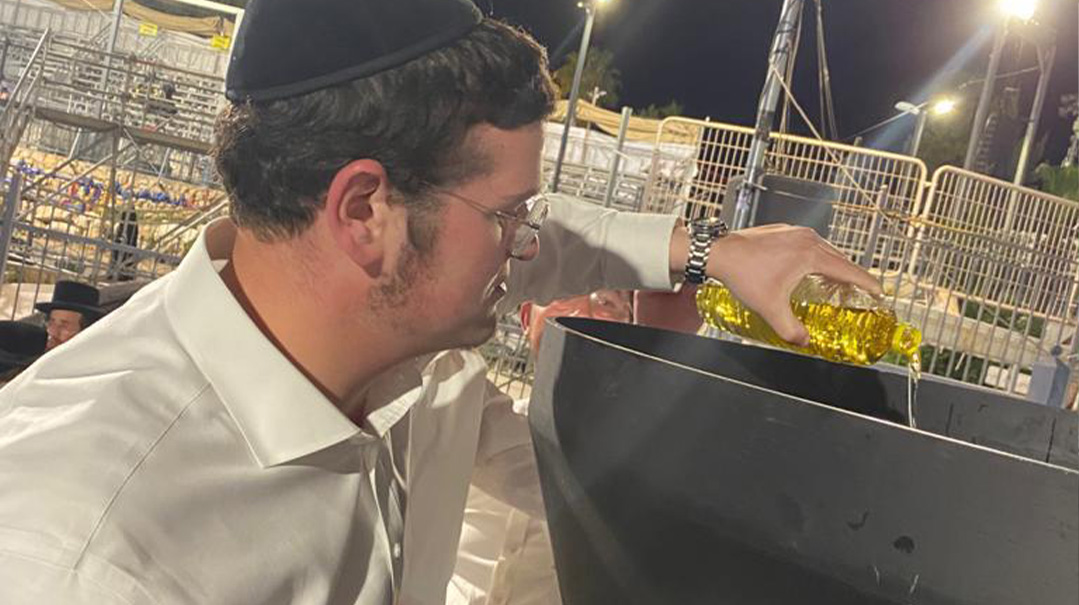
Dovi wouldn’t let an opportunity go by without grabbing it — how could he be in Meron and not pour oil into the hadlakah?
The Last Dance
A few weeks later, Dovi wanted to make sure to maximize Lag B’omer in Meron (which was on Thursday night and Friday last year), and in his inimitable style, found a place in Meron where 20 friends could stay from Wednesday through Shabbos.
“They rented a house, had the privilege of pouring oil into the hadlakah, brought cases of drinks for ‘chai rotel,’ and discovered a kumzitz next door with Chaim Yisrael,” says Reb Shloimi as he recounts the hours leading up to the news that would forever change his family’s life, a vision that’s played in his head every day for the last year. “He really got the best of it, so much so that he sprained his ankle and Hatzolah people wanted to send him to the hospital for X-rays.”
But Dovi would have none of it. “I came to Meron to be by Rabi Shimon, and I’m not going anywhere. I have a bandage and an ice pack. Tatty, don’t worry, I’m okay,” he told Reb Shloimi over the phone.
That was the last conversation they had.
“On Thursday afternoon around Minchah time in Montreal, the news of the disaster started filtering in,” Reb Shloimi remembers. “It was horrible, but I wasn’t really worried about Dovi. He somehow got VIP cards for himself and his friends, so I knew they were high up, away from the crush. I’d also gotten two voice messages from Dovi’s friends saying that he was spotted. And my son Tzvi, who was newly married and was in Meron with his wife, let us know that he’d seen Dovi high up in the crowd, happily signaling him with a thumbs-up.”
But it was getting later, and there were still two boys from the Mir not accounted for — Dovi Steinmetz and his good friend Yossi Kohn from Cleveland.
“As the hours passed, I used all my connections — bochurim, relatives, askanim —everyone was calling around, to friends, to the yeshivah, to Zaka, MDA, Hatzolah, the hospitals. I remember calling one of the hospitals and they said, ‘Od paam Dovi Steinmetz? Who is he, some royalty?’ I told my wife, im yirtzeh Hashem when we find him, he’ll have been the most wanted person in Israel.
“Around five in the morning, although we still couldn’t find him, we heard he wasn’t on ‘The List,’ so we thought, baruch Hashem, there’s hope,” Reb Shloimi continues. What they didn’t know was that there was more than one list. “Meanwhile, I went to the mikveh and to shul to pick up my tallis and tefillin to daven at home so that I’d be reachable. And I sent my son Yudi, who lives in Monsey, to the kever of the Ribnitzer Rebbe and told Tzvi to go to the Kosel to daven.”
Tzvi never made it to the Kosel, though. Because just then Reb Shloimi got the message no one ever wants to hear: “Send someone from the family to Abu Kabir [Israel’s forensic institute]. We need an identification.”
Tzvi rose to the occasion, and traveled to Tel Aviv together with a close family friend and one of the rebbeim from the Mir, where they were met by Shloimi’s cousin Moshe Gershon Steinmetz, an askan from Bnei Brak who had been helping with the search.
“I told my cousin, ‘You do the identification, I don’t want Tzvi to see him like this. I want Tzvi to remember him with a big smile and the thumbs-up,’” Reb Shloimi relates. “The one ‘sweetening of the din’ was when they told me that there were no signs of injury. It was as if he went to sleep. This was a huge nechamah to me. Because if Hashem decided it was time to go, it could have been in so many other horrible ways — he was taken on Lag B’omer right next to Rabi Shimon, while trying to save two children.”
(Shloimi Steinmetz later heard from his cousin what happened in the minutes before Dovi died. As he was flying back right after the funeral, Reb Shloimi sent his cousin Moshe Gershon as his emissary to be menachem the other families, and at the home of survivor Rabbi Avigdor Chayut, Rabbi Chayut told him that a Steinmetz boy and his friend Yossi Kohn tried to make a butterfly amid the crush of humanity to protect his own two children. One of them, 11-year-old Shmuel, survived, while 13-year-old Yedidya perished, along with Dovi and his friend Yossi.)
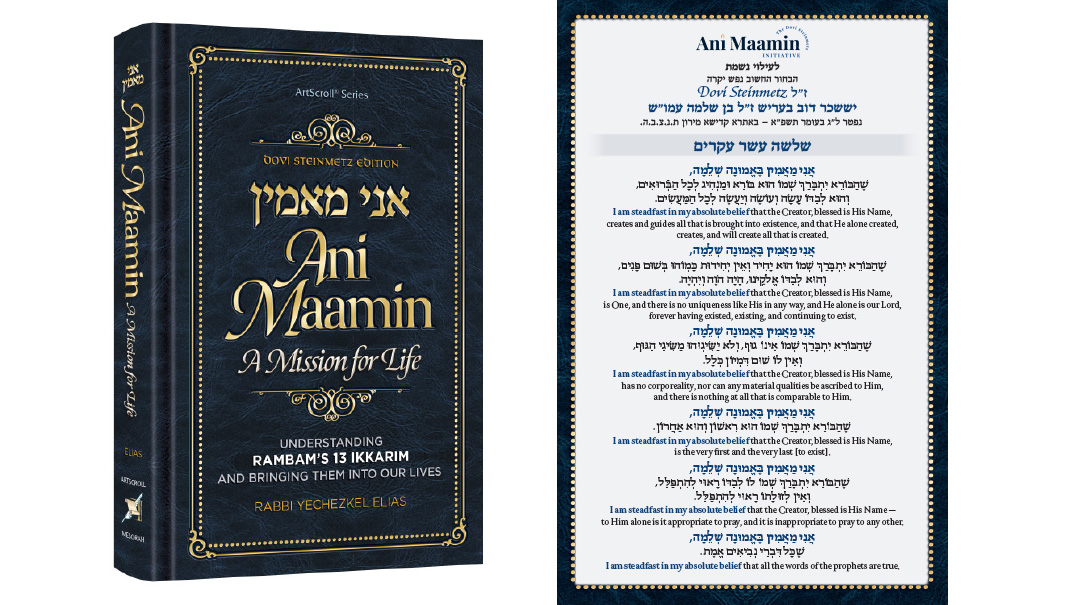
150,000 Ani Maamin cards and a book. It took off beyond anything Reb Shloimi could have imagined
He Was Singing With Us
Reb Shloimi relives the pain and horror of those hours daily, but says that at the same time, he went into technical mode. “Even before they found him, I knew we needed to fly out, so we booked tickets for Motzaei Shabbos from JFK,” he says. The family traveled to Monsey for Shabbos. The levayah would be Sunday afternoon in Eretz Yisrael. It was the hardest Shabbos of his life.
The Steinmetz family was always a cohesive whole, a team, but now the captain was missing. “My wife, Feige, asked, ‘How can I bentsh licht?’ I told her, ‘Dovi’s here — he’s just in the VIP section.’ I kept telling myself, it’s Shabbos now and there’s no aveilus on Shabbos. It’s Shabbos and we’re going to get through this,” he says — and in a way, he’s still telling himself.
On the way to the airport, Feige Steinmetz got a chizuk call from the mother of Shragee Gestetner a”h, a once-popular singer and one of the niftarim, whom she knows from Montreal. It was such an important outreach gesture toward a mother on the way to her son’s funeral that Mrs. Steinmetz turned around and called Chaya Gitty Kohn, the mother of her son’s friend, to give her chizuk as well. It was a network of shattered, struggling women embracing each other in a language only they could understand.
When the family landed, they were met by Zvi Gluck of Amudim, who was in Israel at the time. “He zipped us through all the paperwork and the Covid testing station so that we could make it to Har Hamenuchos before shkiah,” Reb Shloimi says. “We went straight to Har Hamenuchos. I spoke for five minutes, maybe less, as it was getting late.”
But that speech set in motion a campaign that would change people’s lives. It was Reb Shloimi’s personal supplication to Hashem to help him accept the Divine judgment. “We’re maaminim bnei maaminim. We believe. We don’t ask why, we don’t ask questions. But we can ask Hashem to help us through this,” he said in a tear-choked voice heard by thousands over a live hookup.
After the levayah, Mir Rosh Yeshivah Rav Asher Arieli approached Reb Shloimi to be menachem avel. The Rosh Yeshivah told him, “You know, every day we say 13 Ani Maamins, but we never say even one ‘ani meivin.’”
The family sat shivah for two hours and then went back to the airport, arriving in New York the following morning, and sat that first day in Monsey, where hundreds of people whose lives Dovi touched made their way to nichum aveilim.
And then, Reb Shloimi asked the crowd to sing Dovi’s favorite songs. That was easy: In tears, they began to sing in unison “Ani Maamin.”
“I felt like Dovi was singing with us,” Reb Shloimi says. “The whole house could have just floated up to Shamayim, it was so intense.”
The family returned to Montreal for the rest of the shivah, but the tragedy had occurred on an international stage. The entire Jewish world was looking for some level of comfort and closure. So while Shloimi Steinmetz decided on a project l’illui nishmas his son, it somehow took on a life of its own. Dovi in his petirah created a movement.
Just Ninety Seconds
Shivah was over on Friday afternoon. That Shabbos, Rav Yaakov Elya Unsdorfer, rav of Mesivta Reishis Chochmah where the family davens and where Dovi grew up, got up to speak, as he does every Shabbos. This time though, it was a little different.
“We need to take on a kabbalah,” he said. “One that we can hold onto, that’s not too hard to keep.” And with that, he distributed Ani Maamin cards he’d printed, and asked that the shul members say it every day, as a zechus for Dovi’s neshamah. (Those who were already saying it every day were asked to say it with extra kavanah.)
“On Motzaei Shabbos, I got this wild idea,” Reb Shloimi remembers. “What if I can get another thousand people to do this by the next week? It started with a WhatsApp message and a 30-second video clip. I contacted all my connections, my kids’ schools and camps, my relatives — and by the end of the first week we hit 10,000. And it just kept going from there. Hashem gave me the koach to continue. We made contacts in cities all over the States, and then around the world, and I kept printing more and more cards. By the summer, I was printing 30,000 at a time. I can’t tell you how many people are saying it — maybe hundreds of thousands — but what I do know is that I’ve printed over 150,000 cards so far, and that’s not including all those people who just download it off our website. I’m not asking for big kavanos. Just take one minute — the more you make these affirmations of emunah, the more it goes into your bones.”
It started with the cards, moved into a song that will be released by Beri Weber on Lag B’omer, and even morphed into a book.
Since the Ani Maamin initiative began last year, Rav Yechezkel (Chesky) Elias, a rosh kollel in Montreal, has been delivering twice-weekly shiurim on Ani Maamin, and those shiurim have been compiled into a new release by ArtScroll entitled Ani Maamin: A Mission for Life — Understanding Rambam’s 13 Ikarim and Bringing Them into our Lives.
And perhaps this is really the theme of Shloimi Steinmetz’s story: He did something huge for Dovi, but it went so much further. So Dovi, maverick and mover that he was, is able to break through barriers from the Olam HaEmes that he couldn’t in his lifetime.
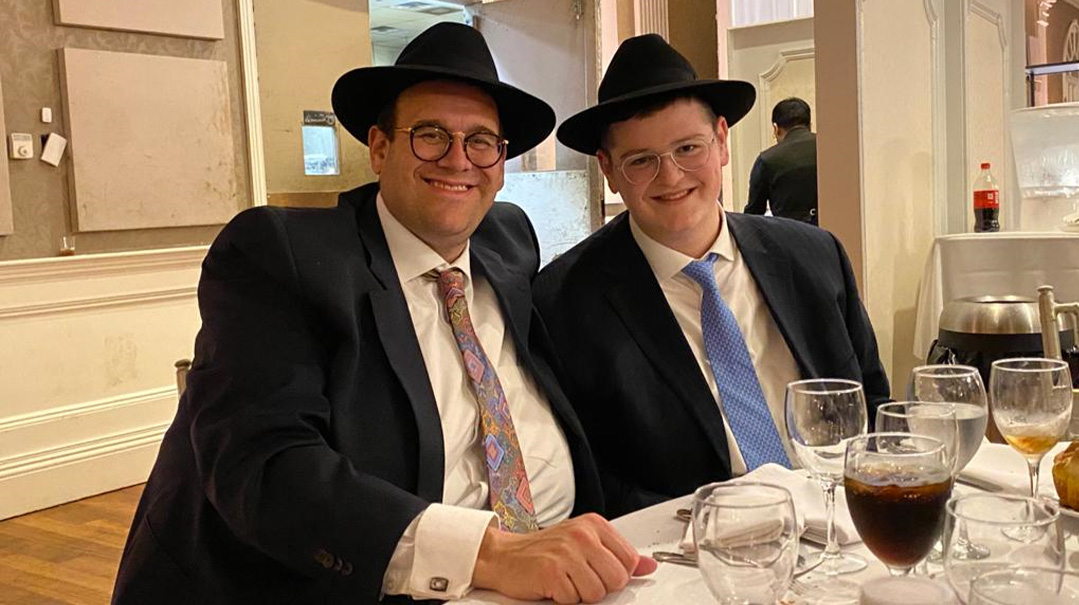
No Questions
This year Lag B’omer, Shloimi Steinmetz is heading back to Eretz Yisrael, for a happier occasion — to pick up a completed sefer Torah written for Dovi, begun on the last day of the shivah. The “chuppah” will be the week after Shavuos. He’s also planning on being in Meron for Lag B’omer.
“I have to have a long conversation with Rabi Shimon,” he says. “We have a lot to discuss. He put me into this, now I need his help.”
But even before that all-important conversation, has Reb Shloimi already seen a switch in his own life, in the way he looks at things today?
“Well, it doesn’t happen overnight, but I’ll tell you something: I manufacture doors, and one of my managers would always hear from me if something bad would happen or if he was worried, ‘Don’t worry, G-d runs the world.’ When this happened, he told me, ‘All these years you’ve been telling me G-d runs the world and that you need to accept everything that happens — and now I see you actually meant it!’”
But he thinks for another minute and admits, “Look, I realize that I’ll never again be who I was, because we got hit with such a klop. Part of me wants to go back to that innocent self, that place of unchallenged emunah. But for the most part, I think what’s happened is that I’m now almost automatically looking at the good. It’s so easy to see the bad, to be critical, to question the Master Plan. Today I know that it’s all good. And not just that I know — I really feel it in my bones.
“Look, I don’t understand but I accept. I’m just following the Eibeshter, doing what I have to do. I still can’t wrap my head around the tragedy, but Hashem runs the world, and this is what He wanted. But I also see that today, it’s way beyond Dovi Steinmetz. He was the catalyst, but it’s taken on a life of its own.
“Dovi’s life was about doing things in a big way, and this is his style. As many cards as we printed, we always need more. It means that thousands upon thousands of Yidden are taking a minute to affirm that Hashem is in charge of every single thing, that Hashem runs everything. Dovi lived that way too — he did his part, and knew that Hashem would pick up the bottom line. We have no answers, but we have the way we react, the words we use, the songs we sing.
“And when a Yid affirms ani maamin, he’s saying, ‘me too, I’m also connected, I also have the avos hakedoshim in my DNA and I can also express that spark.’
“So it’s not only for Dovi’s neshamah, but for all Yidden. Because it’s not about me anymore, it’s about everyone else.”
(Originally featured in Mishpacha, Issue 910)
Oops! We could not locate your form.

